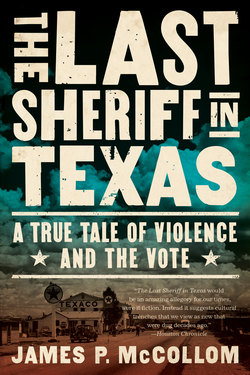Читать книгу The Last Sheriff in Texas - James P. McCollom - Страница 11
На сайте Литреса книга снята с продажи.
Оглавление5
During those first days in the hospital, only his wife, Oncie, and his little daughter, Sarah (two, too small to understand), were allowed to see the wounded sheriff in his hospital room. When Vail regained consciousness, Alfred Allee was allowed to come in. By the following Monday, Vail was ready to talk to Camp Ezell, the newspaper editor. “I proved an old theory, Camp. Even after he’s been shot, a man can kill his enemies.”
“I’d say you did prove that.”
“When the big one emptied those loads in my stomach, I still had that telephone in my hand. And I looked down and the blood was coming out. I had on a fresh starched white shirt. Oncie wife had just ironed it that morning. It was turning red. That just made me mad as hell.”
Most of Vail’s friends were outdoorsmen. Hunters. Lawmen. Oil field people. Camp Ezell didn’t hunt. Camp didn’t own a gun. The newspaper editor, soft-spoken and attentive, took notes.
“I didn’t know whether I would survive, but I was determined that if those bandits killed me, they were not going to live to tell the story. I drew my gun and started shooting from the hip.”
The sheriff spoke deliberately. It seemed the wounds had made him reflective. “There’s some things I want you to put in the paper. I want you to write my thanks, from the bottom of my heart, to the many friends who have sent letters, get-well cards, telegrams, flowers. My Latin American and Negro friends have been very kind to me. I appreciate it. Something else . . . the commissioners. You may not believe it, but I heard from all of them. Jimmy Nichols came by the hospital to see me.”
As to the article in Time, Vail said he objected to the slur against oil field workers and all the factual inaccuracies: “The description of my gun was wrong. He had the wrong hospital. The man didn’t even come down from San Antonio to get the facts.”
A writer in Fort Worth wanted to do a story of Vail’s life. He declined.
“I’ve had enough publicity.”
Vail wore striped pajamas in the newspaper photograph. He lay back on two pillows, hands beneath his head. He looked a little tired and more than a little disgusted. At no time in his life had he spent ten days in a sickbed. Most people had never seen Vail without his hat before.
Get-well cards and letters and telegrams arrived from all across America. (Camp Ezell, always exact, cited thirty-five a day.) The hospital had lost count of the long-distance telephone calls. Sheriffs, highway patrolmen, city policemen, FBI agents in Texas and other states wrote personal letters. The police department in Klamath Falls, Oregon, issued a commendation. So did the Bayou Rifles in Louisiana. W. D. Whalen, governor of the Texas-Oklahoma district of the Kiwanis clubs, issued a citation. And there was a resolution by the Bexar County commissioners:
Whereas the Commissioners of Bexar County, in common with the citizens of Bee County in particular, and of Texas in general, have learned from the daily press of the heroic act of The Honorable Vail Ennis, Sheriff of Bee County, in keeping with the unbroken traditions of the peace officers of this state and an unwavering and unswerving fidelity to the public trust and to law and order . . .
Resolved that when the Commissioners Court shall adjourn today it will stand adjourned as a tribute to and in respect of the Honorable Vail Ennis.
The paper also mentioned that the county commissioners had been moved to pay Vail’s hospital bills. The hospital charge was $730.90. Dr. Edmondson’s fee was $250. The $980.90 was more than three months of the sheriff’s salary.
